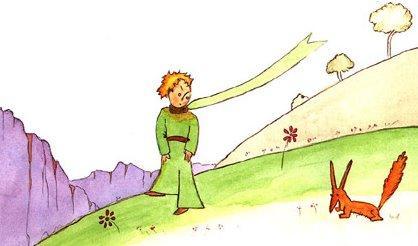Compassion and the Little Prince
I believe that crisis work requires us to love the people we’re helping. Here’s why I say that.
Wind, Sand, Stars, and Love
“Life has taught us that love does not consist in gazing at each other, but in looking outward together in the same direction.” — Antoine de Saint-Exupéry, Wind, Sand, and Stars
I remember falling in love with Saint-Exupéry as a kid. I read The Little Prince at home and then, as my French fluency grew, I read it again as Le Petit Prince in Tom Ham’s class. I remember discussing it in Tom’s classroom on the second floor of Potsdam High School’s older wing, near the music department that was my home-away-from-home for so many years. In my memory I can still smell the peculiar stuffy smell of old carpet heated by ancient steel radiators, the dust mingling with the hot metal smell and only slightly cleared by the breeze through the windows we always left open.
A bit later in life, during my flight training to become a pilot, I rediscovered Saint-Exupéry; or, I should say, discovered him anew. I hadn’t known that he served as one of the pioneering aviators that took the craft of flying to new heights, routinely navigating through dangers far wilder and more intense than the ones I found aloft. He wrote a number of excellent books that touch on his time as a pilot—flying the mail through France, north Africa, and the high mountain ranges of South America.
One of those books is Wind, Sand, and Stars. I recommend reading it in bed with the lights down low, the better to imagine picking your way through the Andes at night, alone, with nothing but the stars to guide you. Picture flying alone, at night and in a storm, the struts and windows of your airplane creaking and moaning in the wind, racing toward a distant airfield knowing that your only aid will come from a guy with a lantern standing at one end of the runway… if he remembers to wake up this time.
This strikes me as kind of similar to how crisis feels.
The Little Prince
“It is only with the heart that one can see rightly; what is essential is invisible to the eye.” — Antoine de Saint-Exupéry, The Little Prince
In crisis work, we spend a lot of time talking about empathy. Most social work folks have heard of unconditional positive regard, which basically means that we try to give callers the benefit of the doubt and assume that they’re good people who are doing the best that they can.
I sometimes frame it as a reminder: that whatever the facts may be, people are mostly doing their best, and that everything works better if we assume they have good intentions than if we treat them like idiots, self-saboteurs, or fools.
The Little Prince’s quote feels relevant here: in the crisis context, we often see more clearly if we look with empathy (the heart) than if we look with the eye (the rational fact-checking mind). Connect with how people feel and you’ve got a solid chance of helping them—and until you do that, all the intellectual stuff in the world won’t help them.
Where we choose to stand
“The heart of crisis work is compassion: standing shoulder-to-shoulder with people in their pain.” — Peter Meyers
Peter is an old friend of mine, a sweet man with a wild eye, a Master’s degree in Episcopal theology, and a career running the crisis hotline in Jackson, MS. We served together for several years on the national board of Contact USA, which gave us plenty of time to talk. Being of a similar mindset—guys who like sitting around and Thinking About Things—I enjoyed those conversations a great deal.
Peter’s vision of crisis work was simple: we are there to stand shoulder-to-shoulder with people in their pain, neither dragging them out of it nor pushing them ahead, but staying with them. Being fully present and fully honest with the hard stuff that brought people into crisis, looking unflinchingly at it with them, and helping them to feel that they don’t have to deal with it alone, no matter how bad it gets.
In Peter’s philosophy, what is essential about the work of crisis counseling is that we be there, seeing with our hearts, shoulder-to-shoulder with the person, looking outward together at the stuff they’re going through.
“Looking outward together”… that’s why I think that crisis work is about love.

I hope you can all appreciate how hard it has been for me to refrain from pointing out that, by writing that immortal line about seeing with the heart and essential things being invisible to the eye, Antoine de Saint-Exupéry also shaped—way back in 1943—the definitive answer to the question: what does the fox say?







“If I speak in the tongues of mortals and of angels, but do not have love, I am a noisy gong or a clanging cymbal. And if I have prophetic powers, and understand all mysteries and all knowledge, and if I have all faith, so as to remove mountains, but do not have love, I am nothing. If I give away all my possessions, and if I hand over my body so that I may boast, but do not have love, I gain nothing.”
Hear hear, Jay! I’ve loved that paragraph ever since I first heard it, not in church, but in Morris West’s Shoes of the Fisherman, a film that made a big impression on me about people in power using that power for meaningful good. West sets it in a slightly different translation, but the message is there, and the message is good.